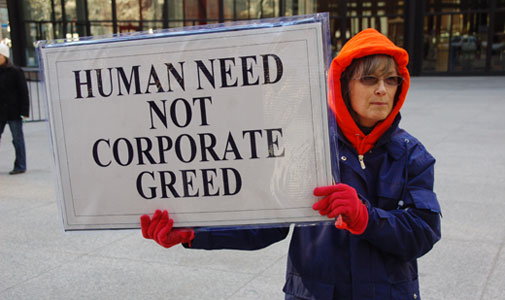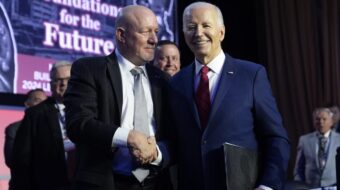
WASHINGTON – Voters in 54 “battleground” GOP-held congressional districts overwhelmingly hate big and secret money in politics and are apparently willing to punish candidates who do nothing about it, a new survey says.
But the Greenberg Quinlan Rosner poll for The Democracy Project also discloses that voters are so disillusioned that a plurality believes – and they volunteered this response – neither the Democrats nor the Republicans want to clean up the mess in Washington. And big money influence overrides voter wishes, respondents add.
The survey is noteworthy because of the big role of so-called SuperPACs in the 2012 election. The SuperPACs, overwhelmingly Republican, let big givers – corporations and individuals – conceal their money while influencing political races, not just for the presidency but for Congress. And donation amounts are unlimited.
Estimates of total election spending, including SuperPAC money in GOP presidential and congressional primaries, and the general election for the presidency and Congress, range up to $6 billion combined, the pollsters say. Virtually all is hidden.
And opposition to SuperPACs and their spending among voters in battleground districts – already bombarded with SuperPAC ads – is by 68%-6%, the survey says.
Voters of all stripes want to limit big money’s impact. When asked “how impor-tant is it to you personally” there are such curbs, Democrats called limits important by 85%-13%, as did independents (78%-20%) and even Republicans (70%-29%).
“Any candidate running against incumbents corrupted by Washington should be promoting their reform agenda, starting with the transparency and including limits on campaign funding so the country can work for the middle class again,” the survey said.
Labor, which does not have the billions of big business and its backers, has set up its own smaller SuperPAC to allow it to communicate with non-union voters and families. But it will rely on shoe leather to counter the other side’s cash, AFL-CIO President Richard Trumka says.
“Our road will be steep. The fight will be tough. We’re going to see an anti-union ad blitz…but we’ll stay focused-knocking on doors, running our program, with Labor-to-Neighbor and phone banks, worksite leafleting,” he said on Sept. 20 in Los Angeles.
As one example, a new mass-mail letter from “Romney Victory,” a PAC for big givers to GOP nominee Mitt Romney, seeks at least $1,000 each. It tells donors their first $5,000 will go to that fund and bring “dedicated” contacts with campaign insiders. The $5,000 is the legal maximum an individual can openly give.
But the donation slip for the mailer – whose cover letter slams labor as well as President Obama and other Democrats – has lines for contributions of up to $78,500, which it calls “the maximum.” The letter, robo-signed “Mitt,” does not say where the rest of the money, beyond the first $5,000, will go.
That’s the type of thing that really turns survey respondents off.
The pollsters reported 78% of constituents in the 54 most hotly contested GOP-held districts “say it is important for their candidates to come up with a new plan to reduce the amount of money in politics and the influence of SuperPACs.” By 60%-30%, voters call the cascade of campaign cash “a corrupting quid pro quo” in politics.
“Two thirds (64%) say our current system undermines democracy because big donors and secret money control which candidates we hear about. By contrast, just 29% believe that in the end it is the voters who get to decide,” the pollsters report.
“But when asked which party would do a better job ‘cleaning up corruption in Washington, D.C.,’ 43% volunteered (the pollsters’ emphasis) they believed neither party was equipped to clean up corruption-an option not offered-or simply refused to answer the question.” Democrats and the GOP each scored 27% for the clean-up role.
“This is a striking result and underscores the opportunity of outsider challenge candidates to confront the corrupt process and outcomes in Washington,” pollsters said.
As an illustration of voter antipathy towards the impact of big money and how it would change voters’ minds about a candidate, the pollsters ran a test case using the Medicare privatization plan included in the budget blueprint pushed through the GOP-run House by Rep. Paul Ryan, D-Wis., now Romney’s running mate.
The question was put two ways to Republican voters only in the 54 battleground districts. When Ryan’s plan was described, using his name, and saying it would turn Medicare into a voucher system – a position the overall electorate opposes – the GOP voters agreed with Ryan by a 51%-23% margin.
But when the vouchers were removed and another Ryan plan aspect cited – that “it would benefit insurance companies” and “that the (Republican) candidate took thousands of dollars in campaign contributions from insurance executives, lobbyists and PACs”-those same GOP voters turned against the GOP hopeful, 51%-19%.
Photo: People’s World












Comments